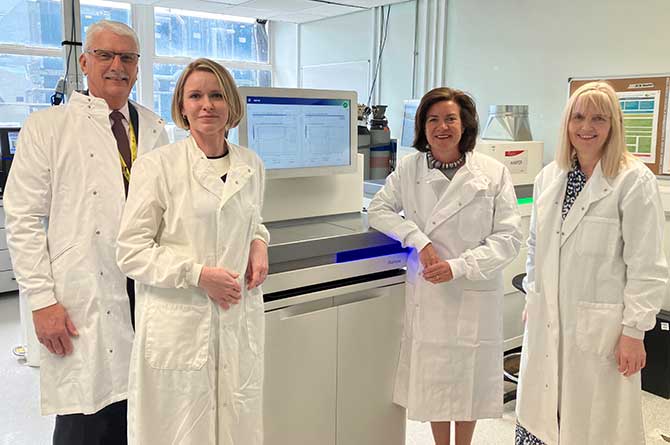Support quality, independent, local journalism…that matters
From just £1 a month you can help fund our work – and use our website without adverts. Become a member today

A new diagnostic blood test is to be trialled in Wales in a bid to speed up treatment for lung cancer.
The ‘liquid biopsy’ means patients will no longer need to have an invasive tissue biopsy to discover their type of cancer through DNA sequencing. Instead, the DNA can be extracted from the blood.
The study will trial the use of the blood test in people with suspected lung cancer. It will look at how its use earlier in the diagnostic process can improve and speed up diagnosis, reduce the time between diagnosis and treatment. It is also looking at how this technology can be rolled out to people with other types of suspected cancer.
The study is being done by the All-Wales Medical Genomics Service (AWMGS), Illumina technology, Life Sciences Hub Wales.
Dr Magda Meissner of the AWMGS told BBC Wales that some patients become too unwell or die while waiting for traditional biopsy results.
She said: “Patients in Wales are diagnosed at an advanced stage – stage three, stage four – and with good outcomes. Sometimes they become too unwell or even die before we can get the test results to them.”
She added: “If we can do a blood sample even before they have a tissue biopsy, we can then identify those potential targets when we can then offer them oral therapy instead of intravenous therapy.”
Lung cancer is the fourth most common cancer in Wales and the leading cause of cancer deaths.
By increasing the use of non-invasive liquid biopsy at an earlier stage of the cancer pathway, targeted treatments can be decided and given quicker, improving patient outcomes and survival rates.
Liquid biopsy as a tool in genomic medicine is expected to become a pivotal part of healthcare and provide a better understanding of illnesses, improve patient outcomes and transform lives.
In the future it has the potential to provide a simple, accessible and reliable means of investigating suspected cancer and less invasive monitoring for cancer recurrence.
Craig Maxwell is a patient who has worked with the research with AWMGS. He was diagnosed with an incurable, inoperable type of lung cancer at the age of 40.
He said: “From the point of discovering my tumour, it took a stressful and hard 72 days to identify my cancer but this new technology will help support and deliver results quicker, allowing cancer patients to get treatment sooner and help them plan, with their families for the new life that exists in front of them.
“Let’s make sure all of Wales has access to these new innovative tests, and our amazing nurses and doctors have access to this technology to help them help us.”
The Welsh Government has launched a new diagnostic strategy for Wales to try and reduce wait times for patient tests.
The Minister for Health and Social Services, Eluned Morgan said: “Wales has been leading the way in how we integrate genomic testing into health services to revolutionise how we deliver healthcare. Liquid biopsies could deliver real benefits for patients in Wales and save lives by helping us detect and treat cancers earlier.
“This is a key example of how working in partnership across a variety of sectors can contribute to improved health outcomes. This is part of our wider work to recover and transform services through the Diagnostic Strategy for Wales.”
Support quality, independent, local journalism…that matters
From just £1 a month you can help fund our work – and use our website without adverts.
Become a member today
